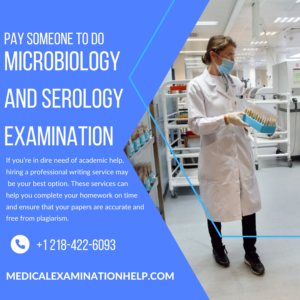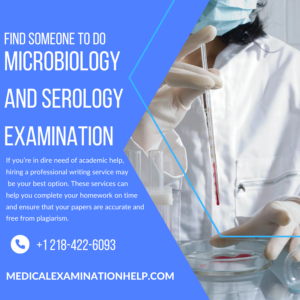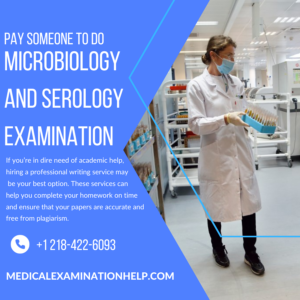
 If you’re looking for someone to do microbiology and serology examination, you’ve come to the right place. We offer a variety of advanced testing, including nucleic acid amplification tests for COVID-19 and antibiotic susceptibility testing.
If you’re looking for someone to do microbiology and serology examination, you’ve come to the right place. We offer a variety of advanced testing, including nucleic acid amplification tests for COVID-19 and antibiotic susceptibility testing.
Great sales copy is engaging, informative, Pay Someone To Take Medical and persuasive. It aims to convert readers into customers by addressing their key pain points.
Microbiology is the fascinating study of microscopic organisms such as bacteria, viruses, fungi, algae, and protozoa. Its application spans across the areas of food safety, disease diagnosis, and even sustaining healthy ecosystems. To conduct tests, microbiologists employ a variety of tools such as electron microscopes and culturing techniques to analyze the behavior and characteristics of these tiny organisms. Antibody serology tests, for example, identify antibodies in the blood that target pathogens (disease-causing germs such as bacteria and viruses). PCR-based molecular tests are used to diagnose infections quickly.
Microbiology is the study of microscopic organisms such as bacteria, viruses, fungi, and algae. It is a vital field of science that helps us understand how these organisms interact with our environment, for example, in food-borne illnesses and in the spread of disease.
Laboratory tests are used to identify and diagnose infections caused by bacteria, fungus, or parasites. In addition to traditional methods, such as culturing and immunology, more advanced molecular techniques are now available, including polymerase chain reaction (PCR), Significance of Microbial Diversity which allows for rapid diagnosis of some bacterial and viral infections.
When a sample is taken from a patient, it is important to ensure the specimen is in a leak-proof sterile container. Specimens should also be stored in a temperature-controlled environment. It can take a few days to a week for germs to grow in the laboratory, and results may not be immediately available. A doctor can review the test results during an office appointment or by phone.
A blood culture test is done by a health care professional in a hospital or other medical setting. It may take a few days to a few weeks to get the results from this test because germs need time to grow in the lab.
The CDC recommends getting this test for people who have been sick, anyone with a weakened immune system, those who travel abroad or work in healthcare settings, Microbial Processes and those who have a history of certain medical conditions such as rheumatoid arthritis. The test can help detect bacterial infections and determine if they are responding to antibiotics. It can also detect if a vaccine is working.
An antibody serology test looks for antibodies in the blood. Antibodies are proteins your immune system makes to fight foreign substances such as viruses and bacteria. The test can tell whether your antibodies are high or low, and it can also show if you have autoantibodies that attack your own body’s tissues (autoimmune diseases). This test can help diagnose some diseases such as Rocky Mountain spotted fever and autoimmune diseases like lupus.
Medical microbiologists are uniquely qualified to review AST results and interpret them for the clinical teams in the context of the Gram stain, other laboratory test results, radiologic imaging findings and patient history. This level of expertise is not possessed by most medical laboratory scientists, laboratory supervisory staff or physicians.
Serological tests detect the presence and concentration of antibodies against viral & bacterial antigens to help diagnose infections and check immune status. They are performed on serum, Microbial Symbiosis heparin-free fluids and some body tissues such as cerebrospinal fluid (CSF), or urine.
The CPEP-training fellowship provides hands-on experience in the basic disciplines of clinical microbiology through bench rotations and contact with pathology residents, faculty, and medical staff. It also provides administrative experience through participation in hospital committee interaction and management of the clinical microbiology labs. Fellows will acquire expertise in bacteriology, mycology, parasitology, virology, molecular and serology.
 The service matches students with an expert in their subject area. They work together throughout the assignment development process, ensuring accuracy, clarity and adherence to academic standards.
The service matches students with an expert in their subject area. They work together throughout the assignment development process, ensuring accuracy, clarity and adherence to academic standards.
The CPEP-accredited program offers comprehensive training in clinical microbiology, conventional and molecular diagnostics and laboratory administration. Trainees rotate through the clinical laboratories of ARUP including bacteriology, Microbiology in Bioleaching mycobacteriology, parasitology and serology (infectious disease and transplant serology). The program is J-1 visa eligible.
This test looks for antibodies in your blood, which are proteins that your immune system makes to fight infection. Your provider will order this test if you have symptoms of a viral, bacterial or fungal infection, such as a fever, headache, sore throat or cough. Your provider may also order an antibody (serology) test if you’re taking medication to treat certain diseases or for other reasons, such as testing your blood for allergies.
Medical microbiologists provide critical leadership for hospitals, health care systems and reference laboratories by guiding clinicians on the optimal diagnostic tools and treatment options for their patients. They also play a key role in the development and implementation of laboratory practices that ensure compliance with regulations and quality standards. They also work closely with other clinical scientists and health care team members to create strategies for addressing emerging pathogens, Industrial Biotechnology syndromes and antimicrobial resistance patterns. They also contribute to educational initiatives for the laboratory workforce.
Microbiology is a branch of science that studies four kinds of microorganisms that cause infectious diseases: bacteria, fungi and viruses, as well as one type of infectious protein called prion. Medical microbiology is the subset of the field that has applications in healthcare and diagnostics.
Trainees will receive a competitive annual stipend and health benefits. Selection for the fellowship is based on merit, Microbiology in Environmental Science without discrimination for non-merit reasons such as race, color, religion, sex, national origin, politics, marital status, sexual orientation or age.
To apply, you must have a doctoral degree in microbiology or a related discipline. You will also need to demonstrate a strong commitment to clinical and public health microbiology. The program has a roster of mentors that provide career and networking advice. Additionally, the Clinical Microbiology Mentoring Subcommittee (CMMS) provides career advancement activities. To check your eligibility, open the ASCP BOC Admissibility Checker. This tool will ask you questions about your degree, training and experience. After responding to all the queries, you will be shown your admissibility results for SM.
 To compose a good medical assignment, one needs to conduct genuine research from dependable sources. This requires a lot of time. This is why students often look for medical science assignment help.
To compose a good medical assignment, one needs to conduct genuine research from dependable sources. This requires a lot of time. This is why students often look for medical science assignment help.
The CPEP-accredited 2-year fellowship offers training in the fundamental laboratory aspects of diagnostic microbiology including bacteriology, molecular microbiology/virology, mycology, Advantage of Serological Tests parasitology and serology through structured bench rotations and didactic lectures. Laboratory management and clinical consultation through hospital committee interaction are also included.
In order to be customer service oriented, you have to be able to listen and understand your customers. This means being able to ask the right questions and clarifying everything that is unclear. You also need to be able to give accurate answers in a timely manner.
In addition to that, you need to be observant and always on the lookout. For example, if you have a few customers who contact you with the same issue it may be a sign of an underlying problem. In such a case, Methods of Microbial Isolation you should notify your devs or business team and see whether it’s something that needs to be addressed.
Being customer service oriented is a company-wide philosophy and it works best when everyone in the organization supports this culture. This includes the CEO and upper management, the sales staff, and even product development and back-end teams. With this approach, you can build long-term customer loyalty and increase your CLV.
A quality oriented approach is based on a company’s ability to offer quality service or product. This business strategy allows companies to attract new customers and protect their existing ones, while minimizing costs. It also helps a company become more competitive by reducing production costs and taking care of employees.
To implement this type of approach, a company must first establish its objectives. These objectives include both management and production. The next step is to set up a quality policy and provide guidelines to all stakeholders. Finally, Bioterrorism Defense Strategy the company must make sure that these guidelines are implemented in a manner that ensures the best results.
In addition, the quality oriented approach should be flexible enough to allow for changes in customer demand or technological advances. It should also be able to incorporate information from outside the organization, such as feedback from consumers. Moreover, the quality oriented approach must be based on a system of continuous improvement.
Microbial serology tests are used to detect antibodies or antigens resulting from an infection-associated immune response. They are performed in microbiology or virology laboratories and on automated blood science tracks. These tests are important for diagnosis, triage and patient management. The cost of serology testing is high due to reagent and technologist time. It is also costly to transport samples between sites.
Local SOPs and national regulations (see scientific information related to UK SMIs) should define which results require urgent communication, Biocontrol Method in order to facilitate timely clinical or public health interventions. This should be based on the risk assessment of the patient and the underlying infection.
Molecular rapid diagnostic tests may reduce the time to effective therapy among patients with bloodstream infections, and are a promising complement to conventional laboratory methods in conjunction with antibiotic stewardship programmes (ASPs). However, mRDTs are costly, and need to be compared with their cost-effectiveness in the context of other strategies for diagnosing infection.